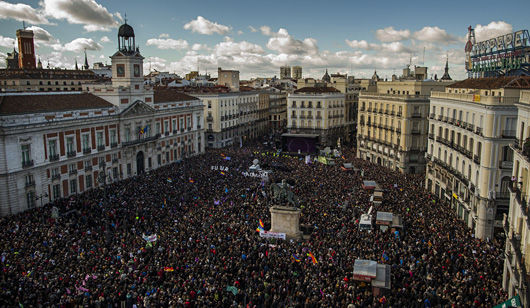
After weeks of political wrangling in Spain after inconclusive parliamentary elections saw no party win a majority, an arrangement among the spectrum of left-wing parties to install a social democratic-led government now appears possible.
On December 20th last year, voters went to the polls to elect the lower house of the Cortes, or Spanish parliament. With no single party capturing enough seats to rule on its own, the outcome has been a nightmare for anyone trying to put together a coherent majority government.
One after another, the major party leaders have come calling on the head of state, King Felipe VI, to discuss the formation of a new government. So far, none of them have met with much success.
Acting Prime Minister Mariano Rajoy, whose right-wing People’s Party (PP) has governed since 2011, told the King that he would be unable to form a new government. His party lost more than 50 seats this time, only managing to secure 123 spots in the 350-seat Cortes. He has not found other parties who are willing to prop up his government and reach the 176-seat majority needed.
A “Portuguese solution”
But last week, it appeared a deal might be possible that would put in power a new government headed by the Socialist Workers’ Party (Partido Socialista de los Obreros de España, or PSOE) and supported by the left-wing PODEMOS Party, the Spanish Communist Party, and other allies.
This possible fix is being called a “Portuguese solution.” Parliamentary elections held in Spain’s western neighbor on October 4th produced a similar outcome of no single party winning a majority. There, a government was put in place headed by the Socialist Party’s António Acosta and supported by the Portuguese Communists, Greens, and the “Left Bloc”.
These leftist groups did not ask for cabinet positions, so it was not a formal “coalition government,” but rather an accord between the signing parties. Because their priority was to get rid of the previous right-wing government and its reactionary policies, the leftist parties agreed to have their parliamentarians vote with a Socialist Party government in order to keep it in power.
In Spain, somewhat equivalent political parties exist. The PSOE, which won 90 seats, resembles the Portuguese Socialist Party. PODEMOS, with 69 seats, has a program similar to the Portuguese Left Bloc. And the United Left, which is centered on the Spanish Communist Party and won two seats, resembles a similar alliance that the Portuguese Communist Party built with the Greens.
But the Spanish situation is complicated by the existence of political parties which advocate the independence of Catalonia in the Northeast and the Basque country in the Northwest. These parties also divide along a left-right axis. In Catalonia, the Esquerra Republicana de Catalunya (Catalan Republican Left), which holds 9 seats in the Cortes, is on the left, while the Democracy and Freedom Party, which has another 8 seats, is on the right.
In the Basque country, the left Euzkadi Herria Bildu (Basque Country Unite) has 2 seats, while the right-wing Euzko Alderdi Jeltzalea (Basque Nationalist Party) holds 6 seats.
A further complicating factor is the existence of a conservative protest party, Ciudadanos (Citizens), which strongly opposes the programs of the Catalan “separatist” parties especially, and has a brand-new presence of 40 seats.
Can a government of the left be formed either by cobbling together a coalition which reaches the magic number of 176 parliamentary seats or on the Portuguese plan of installing an all-PSOE government which the left agrees, on certain conditions, to allow to govern?
Historical divisions stand in the way
There are factors at play which make either outcome difficult to achieve. Historical anti-communist attitudes remain strong among important sectors of the PSOE. Additionally, differences between the PSOE on one hand, and the Communists, PODEMOS, and the Catalan and Basque left on the other, make coalition-building even harder.
Though neither PODEMOS nor the Communists are for the breakup of Spain on ethnic lines, they are not adamantly opposed, as is the PSOE (as well as Ciudadanos and the PP), to plans of the regional Catalan government to carry out a referendum on the subject.
Moreover, the Communists have ties with the Catalan Esquerra which go back to the days of the Spanish Civil War of 1936-39, when the two parties were allied in the fight against Francisco Franco and fascism and suffered severe repression after Franco’s victory (as did the Basques). In Spain, new mass graves of people massacred by Franco’s forces are found every year and the topic of how to deal with that horrible period in history is very much alive.
Last week, it appeared, however, that an agreement might be reached among the PSOE, PODEMOS, and the United Left to form a government along lines similar to those of Mr. Acosta’s government in Portugal. On Tuesday, the King asked PSOE Secretary General Pedro Sánchez to make the attempt.
A possible deal
Under the proposal, the PSOE would form a government supported in power by PODEMOS and the United Left, as well as the Catalan Esquerra. Their backing would be based on a minimum program of ousting Rajoy’s PP and undoing some of its right-wing policies, including anti-worker labor “reforms”, austerity measures, restrictions on women’s reproductive rights, and the repressive “gag law” limiting freedom of speech and assembly.
PODEMOS’ leader Pablo Iglesias, as well as Communist Party Secretary General José Luis Centella and the United Left’s Alberto Garzón, have all called for such an arrangement. Sánchez, standing at the head of the PSOE, appears to be very open to it too.
However, the prospect of a Socialist government supported by the leftist parties led to an uproar within some sectors of Spain’s oldest social democratic party. Forces to Sánchez’s right within the PSOE would rather see a right-center alliance with Rajoy’s PP than be reliant on the leftist parties. The loudest protests are coming from the faction of former Prime Minister Felipe González, who headed the Spanish government from 1977 to 1982 and again from 1996 to 1997.
González is considered to be well to the right within the ideologically heterogeneous PSOE. Since leaving power, he has spoken out forcefully against the socialist governments of Venezuela and Cuba, allying himself with shady right-wing forces in Latin American politics in the process.
PODEMOS’s Iglesias and others on the left, who admire Latin American moves to the left such as Hugo Chávez’s “Bolivarian Revolution,” have condemned him for doing this. This has led González’s allies in the PSOE to denounce PODEMOS and the Communists and call for the PSOE to form a right-center government with the PP. This same faction also stands opposed to the idea of cooperation with Catalan and Basque separatists.
In Portugal, Acosta was ultimately able to overcome resistance from the right within his own Socialist Party and assemble a government with Communist, Green, and Left Bloc support. It now remains to be seen if Sánchez can pull off a similar achievement in Spain. If not, voters will be forced back to the polls within a few months’ time.
If the Spanish parties do manage to imitate the Portuguese example, their accomplishment could have broader importance for the whole of Europe, as it would open the door to new advances for the left and the working class.
Photo: Tens of thousands march through Madrid in a show of strength for the leftwing party Podemos. | Andres Kudacki/AP

MOST POPULAR TODAY

High Court essentially bans demonstrations, freedom of assembly in Deep South

UN warns that Israel is still blocking humanitarian aid to Gaza

Resource wars rage in eastern Congo, but U.S. capitalism only sees investment opportunity

U.S. imperialism’s ‘ironclad’ support for Israel increases fascist danger at home







Comments